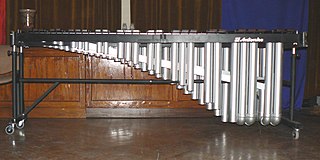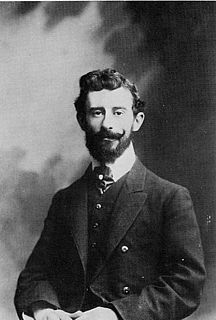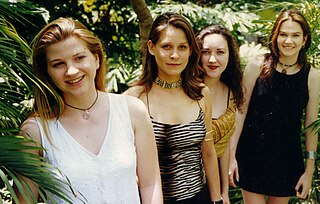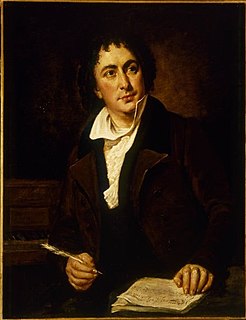Related Research Articles

The xylophone is a musical instrument in the percussion family that consists of wooden bars struck by mallets. Like the glockenspiel, the xylophone essentially consists of a set of tuned keys arranged in the fashion of the keyboard of a piano. Each bar is an idiophone tuned to a pitch of a musical scale, whether pentatonic or heptatonic in the case of many African and Asian instruments, diatonic in many western children's instruments, or chromatic for orchestral use.

The marimba is a percussion instrument consisting of a set of wooden bars struck with yarn or rubber mallets to produce musical tones. Resonators or pipes are suspended underneath the bars to amplify their sound. The bars of a chromatic marimba are arranged like the keys of a piano, with the groups of two and three accidentals raised vertically, overlapping the natural bars to aid the performer both visually and physically. This instrument is a type of idiophone, but with a more resonant and lower-pitched tessitura than the xylophone. A person who plays the marimba is called a marimbist or a marimba player.

The celesta or celeste, also called a bell-piano, is a struck idiophone operated by a keyboard. It looks similar to an upright piano, albeit with smaller keys and a much smaller cabinet, or a large wooden music box (three-octave). The keys connect to hammers that strike a graduated set of metal plates or bars suspended over wooden resonators. Four- or five-octave models usually have a damper pedal that sustains or damps the sound. The three-octave instruments do not have a pedal because of their small "table-top" design. One of the best-known works that uses the celesta is Pyotr Ilyich Tchaikovsky's "Dance of the Sugar Plum Fairy" from The Nutcracker.

The xylorimba is a pitched percussion instrument corresponding to a xylophone with an extended range.

Percy Aldridge Grainger was an Australian-born composer, arranger and pianist who lived in the United States from 1914 and became an American citizen in 1918. In the course of a long and innovative career, he played a prominent role in the revival of interest in British folk music in the early years of the 20th century. Although much of his work was experimental and unusual, the piece with which he is most generally associated is his piano arrangement of the folk-dance tune "Country Gardens".

Music for Strings, Percussion and Celesta, Sz. 106, BB 114 is one of the best-known compositions by the Hungarian composer Béla Bartók. Commissioned by Paul Sacher to celebrate the tenth anniversary of the chamber orchestra Basler Kammerorchester, the score is dated September 7, 1936.

Tender Prey is the fifth studio album by Australian rock band Nick Cave and the Bad Seeds, released on 19 September 1988 on Mute Records. Produced by Flood, the album was recorded during several sessions over the course of four months in West Berlin—where the band were based at the time of its release—and London and dedicated to Fernando Ramos da Silva.

Miroirs is a five-movement suite for solo piano written by French composer Maurice Ravel between 1904 and 1905. First performed by Ricardo Viñes in 1906, Miroirs contains five movements, each dedicated to a fellow member of the French avant-garde artist group Les Apaches.

A Sun Came! is the debut album by American singer-songwriter Sufjan Stevens, released in 1999 on Asthmatic Kitty. It was reissued four years later. Among Stevens' back catalog, A Sun Came is notable for being recorded on four-track.

Steve Reich and Musicians, sometimes credited as the Steve Reich Ensemble, is a musical ensemble founded and led by the American composer Steve Reich to perform his compositions. This ensemble has premiered many of Reich's works and has performed his works more than any other. The ensemble received a Grammy Award in 1999.

Blue King Brown are an Australian urban roots ensemble formed in 2003 in Byron Bay by mainstays Nattali Rize and Carlo Santone. They have released three studio albums, Stand Up, Worldwize Part 1 – North & South – which reached the ARIA Albums Chart top 50 – and Born Free. They have toured nationally and internationally; and supported concerts by Santana, Michael Franti & Spearhead, Damian Marley, the John Butler Trio, the Cat Empire, Silverchair, Dispatch and Powderfinger.

Stuart Saunders Smith is an American composer and percussionist. After having studied composition and music theory at three music institutions, Smith is currently based in Vermont, America with his wife Sylvia. He has produced almost 200 compositions, half of which were written for percussion instruments with a focus on the vibraphone.
"Sheep may safely graze" is a soprano aria by Johann Sebastian Bach setting words by Salomon Franck. The piece was written in 1713 and is part of the cantata Was mir behagt, ist nur die muntre Jagd, BWV 208. The cantata's title translates The lively hunt is all my heart's desire, and it is also known as the Hunting Cantata.

Sebastian Hardie were Australia's first symphonic rock band. They formed in Sydney in 1967 as Sebastian Hardie Blues Band but dropped the 'Blues Band' reference when they became pop-oriented. By 1973 they developed a more progressive rock style, and later performed as Windchase, but disbanded in 1977. An early member of Sebastian Hardie was Jon English, who starred as Judas Iscariot in the Australian version of the stage musical Jesus Christ Superstar in 1972, he subsequently had a solo career as a singer, actor and playwright. A later member, Mario Millo became a multi-award winner for his television and movie music.
William Jay Sydeman is an American composer. Born in New York, he studied at the Mannes School of Music, where he later taught composition (1960–1970). Winning early acclaim for his avant-garde music, he felt trapped by the prevailing orthodoxies and moved to California in 1970, beginning a period of wandering during which he also studied Buddhism and Anthroposophy. He joined ASCAP in 1975. In 1981 he settled in Sacramento and resumed composition at his former prolific rate, having newly embraced a neotonal musical language. He currently resides in Mendocino.
Colonial Song is a musical composition written by Australian composer Percy Grainger. Although Grainger created versions for different types of musical ensembles, its most commonly used version today is for concert band.

Tulipan was a Brisbane-based Hungarian fusion band who were active from 1993 to 2000.
Virag Antal, founder of the group, learned to play the traditional folk instruments hurdy-gurdy, zither and cimbalom or hammered dulcimer while at school in Hungary. She started the group in 1993 at the Queensland Conservatorium of Music among fellow students as a project. Before long the group started receiving requests to play at venues such as the indie-music nightclub The Zoo in Brisbane.
Barbara Woof is an Australian-Dutch composer and music educator.
Clair Omar Musser (1901–1998) was a marimba virtuoso, a conductor and promoter of marimba orchestras, a composer, a teacher, a designer of keyboard percussion instruments, an inventor, and an engineer for Hughes Aircraft.

The earliest western musical influences in Australia can be traced to two distinct sources: in the first settlements, the large body of convicts, soldiers and sailors who brought the traditional folk music of England, Wales, Scotland and Ireland; and the first free settlers, some of whom had been exposed to the European classical music tradition in their upbringing. An example of original music by a convict would be an 1861 tune dedicated to settler James Gordon by fiddler constable Alexander Laing. Very little music has survived from this early period, although there are samples of music originating from Sydney and Hobart that date back to the early 19th century. Musical publications from this period preserved in Australian libraries include works by Charles Edward Horsley, William Stanley, Isaac Nathan, Charles Sandys Packer, Frederick Augustus Packer, Carl Linger, Francis Hartwell Henslowe, Frederick Ellard, Raimund Pechotsch and Julius Siede.
References
- 1 2 3 "Music Details for Sunday 27 July 1997: Sunday Live". ABC Classic FM. Archived from the original on 17 September 2002.
- ↑ "In rhythm with music lessons", Knox Leader, 1 August 2006
- 1 2 3 4 5 Manheim, James, "Percy Grainger: Tuneful Percussion - Woof! Percussion Ensemble | Songs, Reviews, Credits", AllMusic , retrieved 17 March 2018 Note: user may have to click on a tab, e.g. 'Credits' to access further information.
- 1 2 3 "CD: Tuneful Percussion / Percy Grainger; [performed by] Woof!". Australian Music Centre . Retrieved 17 March 2018.
- ↑ "ARIA Awards – History: Winners by Year 2001: 15th Annual ARIA Awards". Australian Recording Industry Association (ARIA). Archived from the original on 26 September 2007. Retrieved 17 March 2018.